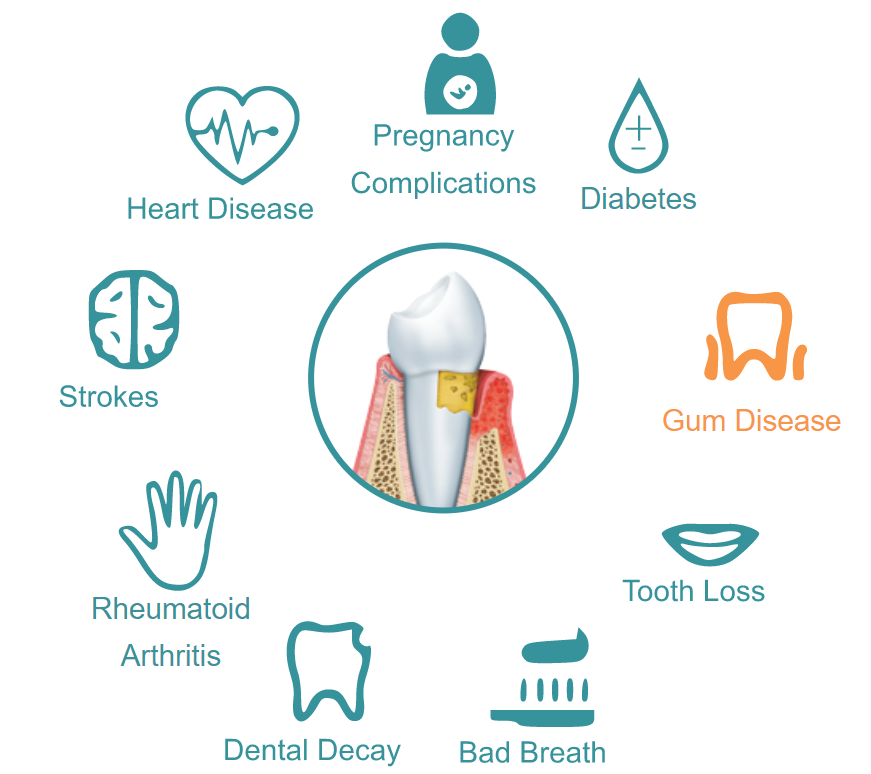
At Dynamic Dental Wellness, we are very passionate about oral health and its link to systemic wellness. Salivary analysis is offered to all patient who wish to receive detailed information and targeted treatment. Dr. Salartash uses this highly effective salivary diagnostic testing for early detection of periodontal disease, bacterial risk for cavities, periodontal genetic disease risks, inflammatory markers, as well as screening for risk associated with oral HPV, HSV, chlamydia, gonorrhea, candida and yeast infections. The ability to detect and provide treatment modalities at an earlier and more treatable stage is a huge benefit to our patients. This is a total approach to oral/systemic health because patients are more motivated to engage with periodontal therapy due to their deeper level of understanding.
At Dynamic Dental Wellness, we can test for the profile of oral bacteria that cause periodontal disease using oral DNA system. These bacteria, in high concentrations, and in combination with an individual’s genetic inflammatory response, result in bad breath, painful, bleeding gums, loss of bone and eventually tooth loss. But the consequences of these same bacteria fermenting under the gums for a period leads to life- threatening diseases beyond the mouth. If these oral pathogens are not treated, we see the transmission of these bacteria to other organs and severe consequences:
Cardiovascular disease: The risk of a first myocardial infarction is associated with periodontal disease. Periodontal bacteria cause inflammation of the arterial wall. In order to help prevent heart and vascular disease, testing our patients for which types and what levels of these dangerous bacteria are present will allow us to provide them with targeted treatment.

Diabetes: Elevated levels of periodontal bacteria can directly cause hyperglycemia. Long term, the inflammation associated with increased pathogen burden can affect the health of the pancreas, and specifically, there is the risk of the loss of beta cells that produce insulin and respond to elevated blood glucose. Correspondingly, persons with elevated blood glucose are at risk for progressive periodontal infection and inflammation. So, by these opposing mechanisms, the relationship of periodontal disease and pre-diabetes and diabetes is viewed as a two- way street. Early detection of periodontal infection and proactive management to reduce bacterial loads can improve blood sugar control and lessen the complications of diabetes as well as the consequence of periodontitis.
Pregnancy Complications: The oral microbiota changes when women become pregnant, and levels of periodontal pathogens increase. During pregnancy, periodontal inflammation worsens, mostly due to increased bacteria levels. Among these oral pathogens, there is a marked risk of infection of the maternal blood and the placenta, which leads to an increase in pre-term labor, lower birth weight and even the chance of fetal loss due specifically to two specific periodontal bacteria. Further, the long-term risk for systemic disease in mothers with periodontitis. For these reasons, consider testing all women who are planning a pregnancy with the goal of reducing these bad bacteria.
Development of Cancer and Risk of Progression: Different type of periodontal bacteria are associated with different cancers. For example, patients with elevated levels of the bacteria A.a. and P.g. have a greater chance of breast cancer and recurrence or failed response to treatment.
Joint and Musculoskeletal Health: Rheumatoid arthritis is a chronic inflammatory condition. In a recent study there was a significantly increased risk of periodontitis in patient with RA. Targeted Periodontal Therapy may reduce symptoms and improve the prognosis of the arthritis.
Dementia and Brain Health: Recent medical studies show poor gum and oral health is associated with increased risk to develop Alzheimer’s and other types of dementia. Additionally, the direct effects of those oral bacteria to cause atherosclerosis in the vessels within the brain leads to significant risk for stroke.
The traditional way of addressing gum disease is based on an examination and determination of symptoms, but since each person is different and brings with them a unique set of circumstances and challenges, the effectiveness of this approach can vary. Modern advancements in periodontal technology, however, have given us Oral DNA Testing, in which you undergo a simple, quick, non-invasive, and pain-free process. It’s as simple as swishing and collecting your saliva in our sample test tube.

What comes back is a report that shows what kind of oral bacteria you have. It is armed with this essential data, that helps us at Dynamic Dental Wellness develop a targeted strategy for combating your gum disease.
